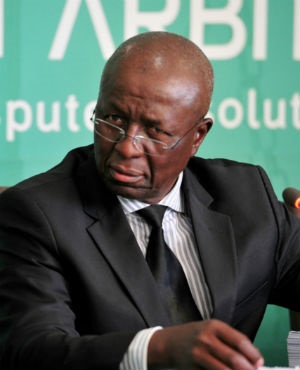
The word "murder" appears only once in Justice Dikgang Moseneke’s 93-page Life Esidimeni arbitration report about the death of 144 mental health care users and the torture of 1418 others.
"Murder" appears as an idiom in relation to disgraced former Gauteng Health MEC Qedani Mahlangu’s conduct in authorising the relocation of mental health care users from Life Esidimeni and placing them in the hands of utterly ill-equipped NGOs in a manner that violated their constitutional right to dignity.
"She acted with impunity thinking that she will get away with murder because the [mental health care] users and their families were vulnerable and poorly resourced," the report reads on page 83.
But to "get away with murder" in the context of Life Esidimeni cannot just be an idiom to describe how Project Marathon – as the relocation was so coldly described – was conceived and executed. The idiom could be as literal and direct as the whole evidence and exposition of the Moseneke report comes tantalisingly close to saying, but never quite says.
Moseneke most likely felt, correctly, that it was beyond his scope to make the definitive accusation of murder, but nevertheless laid excellent grounds for good criminal investigators and prosecutors to explore the charge of murder – or at the very least culpable homicide.
In his report, Moseneke stopped short of accusing Mahlangu, the ultimate political boss who presided over Life Esidimeni and her fellow architects, Dr Tiego Selebano and Dr Makgabo Manamela, of committing multiple murders. Immediately after using the word "murder" in an idiomatic context in relation to Mahlangu, Moseneke quickly makes it clear that her intentions – and presumably the intention of Selebano and Manamela – were a mystery, though certainly ulterior.
The arbitration hearings couldn’t unravel the mystery. For a murder charge to be sustained the intention to kill should be proven. And – or, as Oscar Pistorius’s case taught us – the death should be foreseen. It’s difficult to imagine that Moseneke is not thinking of a murder charge when he writes on page 31 that patients were moved to "death traps" or "sites of torture". (The phrases immediately invoke images of Nazi gas chambers in Germany and Vlakplaas in South Africa).
Since the hearings were not a criminal trial or a criminal investigation, Moseneke was circumscribed to leave his conclusions at the level of doubt. But his inclusive lines are so punchy they’d be very difficult to ignore by prosecutors. Even the sheep that moonlights as head of the National Prosecuting Authority cannot miss this – if he cares enough to read the report.
Moseneke writes: "She [Mahlangu] acted with an ulterior motive that remains concealed even after many days of evidence before the hearing. All we can hope for is that one day, the true reason for the conception and implementation of the Marathon Project will see the light of day."
Indeed, the entire report reads like an agonising journey through which Moseneke – taking with him the aggrieved and the nation – desperately searches for answers to obvious questions. Concealment is typical in murder cases, isn’t it? Remember how difficult it was to unconceal the murder of Constable Francis Rasuge.
On August 1, 2016, when 51 people had already died, Mahlangu failed to mention the deaths in response to a question in the Gauteng Legislature because, according to Manamela, who drafted the responses, the question was not specifically asked.
In his report, Moseneke asks: "Were the deaths of 51 patients, out of their pet project, the Marathon Project, not of sufficient gravity to be reported to the Legislature when the treatment of mental health care users was specifically probed in the Legislature?"
In the next few paragraphs after the question, Moseneke boldly states that Mahlangu, Manamela and Selebano, foresaw more deaths and torture would occur, especially because they knew some of them had already died, notwithstanding their claims that they did not know.
"All three key decision makers in the Marathon Project, in evidence, sought to escape the inevitable and foreseeable results of their reckless and unlawful plan to displace mental health care users from Life Esidimeni facilities," Moseneke says. This bold statement can certainly sustain a culpable homicide charge. But what about murder? It does come close to it. An attempt can be made to press murder charges.
In November 2016 on separate occasions, Health Ombud Professor Malegapuru Makgoba interviewed all three pioneers of Project Marathon. Manamela and Selebano gave contradictory answers about the number of those who had died. For her part, Mahlangu, when told that here had been 77 deaths at that stage, kept saying if she had released the numbers, they would have become a "political game".
Moseneke concluded that the three falsely claimed ignorance. Mahlangu was more concerned about the political game than the truth about the dying patients.
Notwithstanding their evasiveness, the three heads of impunity could not, to borrow a phrase, escape Moseneke’s sharp sword of constitutionalism falling on their stiffened necks. "Blatant breach of the law and the Constitution", "obfuscate rather than stop further deaths", and "arrogant, deeply disregard of Constitutional obligation" are some of the strong phrases Moseneke uses to describe the tragedy.
Evidence submitted by Gauteng Finance MEC Barbara Creecy refuted Malangu’s explanation that the provincial health department had financial constraints and that the Auditor-General had raised concerns about the Life Esidimeni contract. That left Moseneke wondering: what then were the real reasons? He concluded that they were concealed.
The real reasons are hidden in the unexplored explanation contained in Makgoba’s observations. On page 25 of his report, Moseneke cites the observations. Makgoba reported that Manamela and the provincial health department promised to "empower" NGOs and people who could convert their homes in order to accommodate patients.
According to Makgabo, people were "excited" about this opportunity and he observed that the NGOs were "mysteriously" selected. When these observations are read together with Mahlangu’s reported reaction to one of the officials who objected to the relocation from Life Esidimeni, they somehow make sense. She reportedly turned to the official and asked whether he worked for Life Esidimeni (page 82).
The conclusion that one can reach is that Life Esidimeni had a multimillion rand pre-1994 contract which, in the parochial, and more accurately deadly, view of Manamela and others, was not subject to transformation or "empowerment". Life Esidimeni is part of the private health company, Life Healthcare Group. Like many private healthcare providers its shareholders would be white. Understandably so given the history of economic exclusion of black South Africans.
One wonders whether the option of government buying Life Esidimeni was also shelved because it would have benefited white shareholders. Moseneke is also left wondering in his report why the option was not explored.
Manamela and others have used empowerment as an excuse to subject healthcare users to death traps. This is the part that was mostly concealed from Justice Moseneke.
Were Mahlangu, Manamela, Selebano and the Gauteng government embarrassed to say this because South Africans would henceforth be wary of radical economic transformation?
- Mkhabela is a political analyst with the Department of Political Sciences at the University of South Africa.
Disclaimer: News24 encourages freedom of speech and the expression of diverse views. The views of columnists published on News24 are therefore their own and do not necessarily represent the views of News24.




 Publications
Publications
 Partners
Partners






















